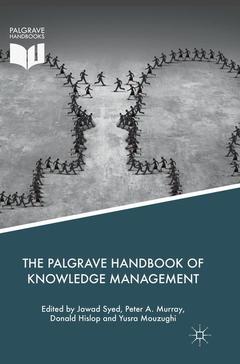The Palgrave Handbook of Knowledge Management, Softcover reprint of the original 1st ed. 2018

This international Handbook provides a comprehensive overview of key topics, debates and issues within the now well-established field of Knowledge Management (KM). With contributions from a range of highly-skilled authors, diverse and multi-disciplinary approaches towards KM are explored in this fantastic new reference work. Topics covered include performance, ethics, sustainability and cross-cultural management, making this an equally important read to academics and practitioners working in areas such as technology, education and engineering. By analysing how the field of KM has developed over the years, as well as presenting new methods to be implemented in the workplace, this Handbook outlines a research agenda for the future of organisational learning and innovation.
Chapter 1. Introduction: Managing Knowledge in the Twenty-First Century; Jawad Syed, Peter A. Murray, Donald Hislop and Yusra Mouzughi.- Part I. Conceptual and Theoretical Foundations of Knowledge Management.- Chapter 2. The Domains of Intellectual Capital: An Integrative Discourse Across Perspectives; Peter A. Murray.- Chapter 3. Critical Evaluation of Nonaka’s SECI Model; Marion Kahrens and Dieter H. Früauff.- Chapter 4. Organisational Learning and Knowledge
Management: A Prospective Analysis Based on the Levels of Consciousness; Ricardo Chiva, Rafaeal Lapiedra, Joaquín Alegre and Sandra Miralles.- Chapter 5. Knowledge Management and Unlearning/Forgetting; Karen L. Becker.- Chapter 6 Knowledge Management and Organisational Culture; Oliver Kayas and Gillian Wright.- Chapter 7. Knowledge Management from a Social Perspective: The Contribution of Practice-Based Studies; Silvia Gherardi and Francesco Miele.- Chapter 8. Knowledge Management, Power and Conflict; Helena Heizmann.- Chapter 9. Knowledge Measurement: From Intellectual Capital Valuation to Individual Knowledge Assessment; Mohamed A. F. Ragab and Amr Arisha.- Chapter 10. Knowledge Management and Communities of Practice: Supporting Successful Knowledge Transfer; Deborah Blackman.- Chapter 11. Internalised Values and Fairness Perception: Ethics in Knowledge Management; Isabel Rechberg.- Chapter 12. Knowledge Assets: Identification and Integration; Juani Swart, Cliff Bowman and Kerrie Howard.- Chapter 13. A Gender and Leadership Perspective on Knowledge-Sharing; Memoona Tariq.- Part II. Knowledge Management and Boundary Spanning.- Chapter 14. A Conceptual Perspective on Knowledge Management and Boundary Spanning: Knowledge, Boundaries and Commons; Léo Joubert and Claude Paraponaris.- Chapter 15. Organising Innovative Knowledge Transfer through Corporate Board Interlocks; Rick Aalbers and Bastiaan Klaasse.- Chapter 16. Knowledge Sharing Across National Cultural Boundaries and Multinational Corporations; Jakob Lauring and Ling Zhang.- Part III. Knowledge Management in Practice.- Chapter 17. Enhancing Knowledge Management (KM) in the Fourth Industrial Revolution Era: The Role of Human Resource Systems; Troy Sarina.- Chapter 18. Knowledge Management and Organisational Performance with a Case Study from PDO; Suleiman Al-Toubi and Mailk Hank.- Chapter 19. An Exploration of Knowledge Sharing Practices, Barriers and Enablers in Small and Micro-Organisations; Alex Kevill and Bejan D. Analoui.- Chapter 20. Knowledge Management in Small and Medium-Sized Enterprises; Susanne Durst and Guido Bruns.- Chapter 21. Knowledge Management in the Public Sector; Malik Hank and Suleiman Al-Toubi.- Chapter 22. KM and Project Management; David J. Bryde, Christine Unterhitzenberger, Birgit Renzl and Martin Rost.- Chapter 23. Elucidating the Effect of Post-Training Transfer Interventions on Trainee Attitudes and Transfer of Training: A Mixed Methods Study; Agoes G. Rahyuda, Jawad Syed and Ebrahim Soltani.- Chapter 24. Knowledge Management in Developing Economies: A Critical Review; Mariam Mohsin and Jawad Syed.- Chapter 25. Managing Knowledge and Learning for Process Improvement: A Software-Mediated Process Assessment Approach for IT Service Management; Anup Shreshtha, Eric Kong and Aileen Cater-Steel.- Chapter 26. Best Practices in Knowledge Management: A Review of Contemporary Approaches in a Globalised World; Geoffrey R. Chapman and Stephanie A. Macht.- Chapter 27. A Critical Realist Pathway to Relevant and Ethical Research; Donald Hislop, Peter A. Murray, Saurau Shrestha, Jawad Syed and Yusra Mouzughi.- Chapter 28. Knowledge Management: (Potential) Future Research Directions ; Donald Hislop, Peter A. Murray, Anup Shrestha, Jawad Syed, and Yusra Mouzughi.
Jawad Syed is Dean and Professor of Organisational Behaviour at the Suleman Dawood School of Business, Lahore University of Management Sciences, Pakistan. His main research interests include international human resource management, organisational knowledge, diversity management, and business ethics.
Peter A. Murray is Professor of Management at the University of Southern Queensland in Toowoomba City, Queensland, Australia. He is Leader of High Performance Work Systems in the Australian Centre for Sustainable Business Development with interests in diversity management, organisational learning and the human capital stock.
Donald Hislop is Professor in the Sociology of Contemporary Work at the School of Business and Economics, Loughborough University, UK. In relation to the topic of knowledge management, his interests are broadly focused on social-cultural issues, such as how they shape the character of knowledge processes andpeople’s motivation to participate in them. His most recent project in this area was on the topic of unlearning (the process of abandoning and giving up knowledge) among managers within UK hospitals.
Yusra Mouzughi is Professor of Management and Interim Vice-Chancellor at the newly formed Muscat University in Oman. Yusra has cross-disciplinary research interests spanning knowledge management, knowledge sharing and the sustainability agenda.
Date de parution : 12-2018
Ouvrage de 714 p.
15.5x23.5 cm
Date de parution : 05-2018
Ouvrage de 714 p.
15.5x23.5 cm
Thèmes de The Palgrave Handbook of Knowledge Management :
Mots-clés :
workplace; innovation; organizational theory; ethics; sustainability



